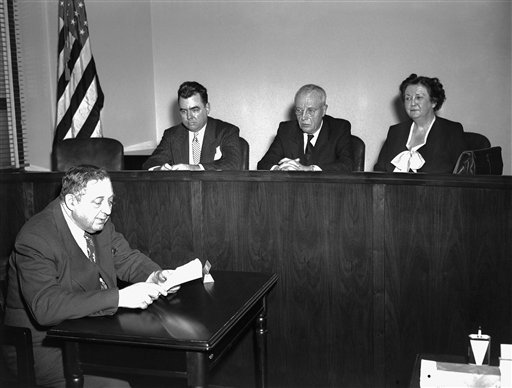In Communist Party of the United States v. Subversive Activities Control Board, 367 U.S. 1 (1961), a divided Supreme Court upheld the legality of a law forcing the Communist Party to register with the federal government.
Communist Party refused to register and list members
In 1950 Congress passed the McCarran Internal Security Act, which defined a “Communist-action organization” as an instrument for overthrowing governments and required the Communist Party of the United States to register with the attorney general. Registration required that the party provide a list of all its current members. The act also denied the freedom of CPUS members to travel outside the Americas or to Cuba. The party’s refusal to register launched 11 years of legal proceedings.
First Amendment freedom of association may be revoked
The right to freedom of association is defended as necessary for individuals to join together and profess ideas. When the right conflicts with national security or some larger public concern, it may be revoked.
Justice Oliver Wendell Holmes Jr., in Schenck v. United States (1919), promulgated the clear and present danger test for making such a determination. Under this test, speech is not protected if it threatens substantial harm, there exists a probability that such harm will occur, and the harm is impending.
Court upheld registration law based on national security
In the majority opinion for the Court, Justice Felix Frankfurter stated that the Communist Party was in fact an action-group and declared as constitutional the requirement that it register on the basis of national security.
Justice Hugo Black was the only one of four dissenters to base his opinion on the argument that the registration provision violated the First Amendment. “The first banning of an association because it advocates hated ideaswhether that association be called a political party or notmarks a fateful moment in the history of a free country. That moment seems to have arrived for this country,” Black wrote.
The other dissenters argued that the registration requirement violated the Fifth Amendment right against self-incrimination.
The case had a narrow application as evinced in Aptheker v. Secretary of State (1964), in which the Court voided the denial of a passport to a Communist Party member. And later courts ruled that individual members could not be compelled to register the party. In Albertson v. Subversive Activities Control Board (1965), the Court declared that registration of an individual amounted to self-incrimination and violated the Fifth Amendment.

